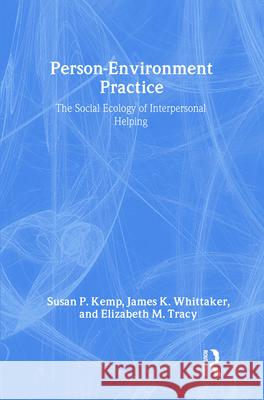Person-Environment Practice: Social Ecology of Interpersonal Helping » książka
Person-Environment Practice: Social Ecology of Interpersonal Helping
ISBN-13: 9780202361024 / Angielski / Twarda / 1997 / 280 str.
Person-Environment Practice addresses a core but long- neglected dimension in social work and human services practice; accurate environmental assessment and strategic environmental intervention. Despite the centrality of "person-environment" as a key construct in direct practice, the domain of environmental assessment/intervention has received relatively little systematic attention in the practice literature. For a variety of reasons, the core focus of direct practice assessment and change strategies has centered more on "person" than "environment." This book seeks to redress that imbalance. Ironically, the relative lack of attention to environmentally oriented practice persists even as current demands of practice fall increasingly under the rubric of what we here call "environmental intervention," defined as both action in the environment and the process of transforming individual and collective perspectives through critical analysis of the impact of environmental conditions. The authors argue that the ability to understand "environment" from the client's perspective and to function effectively in the environmental domain is central to many emergent areas of practice such as practice with extended families and personal networks, practice from a "strengths" perspective, and culturally competent practice. In Person-Environment Practice, the authors offer a coherent critique and overview of environmental assessment and intervention congruent with the demands of both newly emerging and established interpersonal helping approaches within social work's domain. Robert Halpern of the Erikson Institute for Advanced Studies in Child Development described the book as "as clear, thoughtful and subtle a discussion of how to consider the environment in interpersonal helping as I have seen in the literature" and Anthony Maluccio of Boston College called the book "a timely and exciting contribution, with appreciation and respect for social work practices and qualities of inspiration as well as intellectual stimulation" Susan P. Kemp is assistant professor, School of Social Work, The University of Washington, Seattle. James K. Whittaker is professor, School of Social Work, The University of Washington, Seattle. Elizabeth M. Tracy is associate professor, Mandel School of Applied Social Sciences, Case Western Reserve University, Cleveland, Ohio.











